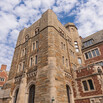Paul Tsai China Center Promotes U.S.-China Communication Amid Bilateral Strains
Official U.S.-China communication was already at diminished levels before the COVID-19 pandemic hit earlier this year, but since the advent of related travel restrictions and lockdowns, it has been even more difficult for the U.S. and Chinese governments to meet and talk with each other.
In such an atmosphere and amid heightened bilateral tensions, dialogue between non-official experts and academics is important to keep lines of communication open; to communicate clear messages from each side, which are often distorted in the media or misinterpreted by the other party; and in the best case, to help to reduce tensions and devise creative approaches to solving problems.
So-called “Track 2” dialogues are aimed at exactly this, and organizing and participating in such dialogues are important parts of the Paul Tsai China Center’s work. Track 2 dialogues have the advantage of being private and away from the media spotlight.
“Since interlocutors are not government officials (although many are former officials) and generally know each other, they tend to be more candid in expressing their personal views and can be frank in stress-testing unofficial proposals,” said Potter Stewart Professor of Constitutional Law Paul Gewirtz4, the Center’s Director. In many cases, he said, the content and conclusions of the dialogue are briefed to sitting government officials on both sides, which can help to move official discussions along.
In recent months, the Paul Tsai China Center has sponsored and organized numerous Track 2 communications with Chinese counterparts. These have included strategic discussions with high-level former Chinese officials and academics affiliated with Peking, Tsinghua, Fudan and Nanjing Universities, the Chinese Academy of Social Sciences, Shanghai Institute for International Studies, and many others.
The Center recruits a diverse group of expert U.S. participants for each Dialogue, including former senior U.S. officials, academics, and think tank experts, and typically works with a counterpart Chinese institution that does the same on the Chinese side.
According to Senior Fellow Susan Thornton5, who previously served as a senior diplomat in the U.S. State Department, “The opinions and views exchanged reflect lived experience in making and implementing policy in government as well as academic expertise, and ideas and recommendations developed at these dialogue meetings are usually conveyed to current senior officials in each country — and also significantly influence the research and publications of the U.S. participants.”
Wherever possible, the Center also includes “next generation” scholars as participants or observers in these dialogues, to ensure that they can hear firsthand the perspectives of Chinese counterparts.
Founded in 1999 as the China Law Center, the Paul Tsai China Center is the primary home for activities related to China at Yale Law School. The Center is a unique institution dedicated to helping advance China’s legal reforms, improving U.S.–China relations, and increasing understanding of China in the United States.


